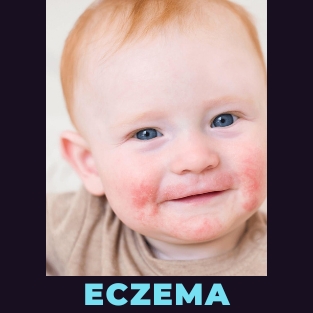Eczema in Children: Parent’s Guide to Soothing Irritated Skin

Introduction
Eczema in children, or atopic dermatitis in children, is a common skin condition affecting millions worldwide. It can be challenging and distressing for both the child and their parents. Understanding eczema and how to manage it is essential for providing relief and improving the quality of life for affected children.
What Causes Eczema in Children?
Eczema in children often has a genetic component, with children more likely to develop it if one or both parents have a history of the condition. Environmental factors such as allergens, irritants, and climate can also trigger flare-ups.
Identifying Symptoms of Eczema in Children
Parents should be vigilant for signs of eczema, including dry, itchy skin, redness, inflammation, and flaky patches. These symptoms can vary in severity and may worsen during flare-ups.
Tips for Managing Eczema Flare-Ups
Managing eczema involves:
- I am keeping the skin moisturized.
- I avoid triggers like harsh soaps and detergents and use only baby shampoo.
- I am using gentle skincare products specially formulated for sensitive skin.
Home Remedies for Soothing Eczema
Home remedies can provide relief from the symptoms of eczema and help soothe irritated skin. Some effective home remedies include:
- Oatmeal baths: Adding colloidal oatmeal to warm bathwater can help reduce itching and inflammation associated with eczema.
- Coconut oil: Applying virgin coconut oil to the affected areas can help moisturize the skin and reduce redness and inflammation.
- Cold compresses: Applying cold, damp cloths or ice packs to itchy areas can provide immediate relief from itching and help reduce inflammation.
Medical Treatments for Eczema
In more severe cases of eczema, medical treatments may be necessary to manage symptoms and prevent flare-ups. These treatments are typically prescribed by a healthcare professional and may include:
- Topical corticosteroids: These anti-inflammatory creams or ointments are commonly used to reduce itching, redness, and inflammation associated with eczema flare-ups.
- Antihistamines: Oral antihistamines can help relieve itching and promote better sleep by reducing the body’s response to allergens that may exacerbate eczema symptoms.
- Immunomodulators: Prescription immunomodulators such as tacrolimus or pimecrolimus can help control inflammation and reduce the frequency and severity of eczema flare-ups.
- Shampoo: Using a gentle, fragrance-free shampoo designed for sensitive skin can help alleviate scalp irritation associated with eczema.
Creating a Skin Care Routine for Children with Eczema
Establishing a daily skincare routine with gentle cleansing and moisturizing can help soothe irritated skin and prevent flare-ups.
Dietary Considerations for Children with Eczema
Certain foods may trigger eczema flare-ups in some children. Identifying and avoiding these trigger foods while incorporating anti-inflammatory foods into the diet can help manage the condition.
Dealing with Emotional Impact
Eczema can have a significant emotional impact on children, affecting their self-esteem and overall well-being. Parents need to provide emotional support and seek professional help if needed.
Preventing Eczema Flare-Ups
Preventing eczema flare-ups involves maintaining a healthy environment, managing stress levels, and avoiding known triggers whenever possible.
Educating Others About Eczema
Educating teachers, caregivers, and other family members about eczema can help ensure proper care and support for children with the condition. Raising awareness in the community can also reduce stigma and promote understanding.
When to Seek Medical Advice
Parents should seek medical advice if their child’s eczema symptoms persist despite home treatment or if they notice signs of infection, such as pus-filled blisters or fever.
Living with Eczema: Outlook and Coping Strategies
While eczema is a chronic condition, most children can lead healthy lives daily with proper management. Finding support groups and learning coping strategies can help families navigate the challenges associated with eczema.
Conclusion
By understanding the causes, symptoms, and management strategies for eczema, parents can effectively soothe their children’s irritated skin and improve their quality of life. Managing eczema is possible with patience, consistency, and support.
Unique FAQs
- Can eczema be cured completely? While eczema has no cure, symptoms can be effectively managed with proper treatment and skincare routines.
- Are all children with eczema allergic to certain foods? No, not all children with eczema have food allergies. However, some may experience flare-ups triggered by certain foods.
- Is eczema contagious? No, eczema is not contagious. It is a non-infectious skin condition with genetic and environmental factors contributing to its development.
- Can stress make eczema worse in children? Yes, stress can exacerbate eczema symptoms in children. Managing stress levels through relaxation techniques and emotional support can help prevent flare-ups.
- Are there any long-term complications associated with childhood eczema? In some cases, children with severe eczema may be at risk of developing complications such as skin infections or chronic skin changes. However, with proper management, the risk of complications can be minimized.






